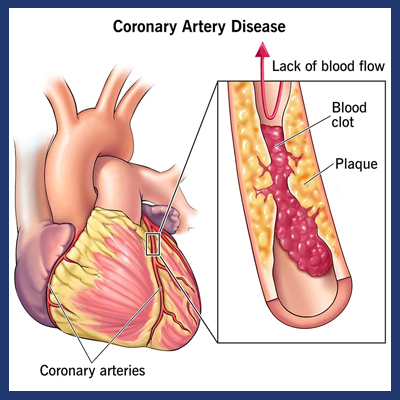

Coronary Artery Disease develops when the major blood vessels that supply to heart become damaged or diseased. Cholesterol-containing deposits (plaques) in coronary arteries and inflammation are usually to blame for coronary artery disease.
The coronary arteries supply blood, oxygen and nutrients to heart. A buildup of plaque can narrow these arteries, decreasing blood flow to heart. Eventually, the reduced blood flow may cause chest pain (angina), shortness of breath, or other coronary artery disease signs and symptoms. A complete blockage can cause a heart attack.
If coronary arteries narrow, they can't supply enough oxygen-rich blood to heart — especially when it's beating hard, such as during exercise. At first, the decreased blood flow may not cause any symptoms. As plaque continues to build up in coronary arteries,following coronary artery disease signs and symptoms may develop
Coronary Artery Disease is thought to begin with damage or injury to the inner layer of a coronary artery, sometimes as early as childhood. The damage may be caused by various factors, including:
Once the inner wall of an artery is damaged, fatty deposits (plaque) made of cholesterol and other cellular waste products tend to collect at the site of injury. This process is called atherosclerosis. If the plaque surface breaks or ruptures, blood cells called platelets clump together at the site to try to repair the artery. This clump can block the artery, leading to a heart attack.
Risk factors for coronary artery disease include:
Sometimes coronary artery disease develops without any classic risk factors. Researchers are studying other possible risk factors, including:
Coronary artery disease can lead to:
The same lifestyle habits used to help treat coronary artery disease can also help prevent it. A healthy lifestyle can help keep our arteries strong and clear of plaque. To improve your heart health, follow these tips:
ACONITE - Very usefull when there is attacks of intense pain extending from the heart down the left arm, with numbness and tingling of fingers and fear and anxiety that he will drop dead in the street. There is nervous and confused in a crowd.Helpful medicine for palpitations with anxiety, cardiac oppression, and syncope which aggravate when walking, lancinating stitches prevent the patient from assuming the erect position or taking a deep breath.Also useful for Panic attacks.
ARNICA : Useful when therte is strain to the heart muscle which produces uncomplicated hypertrophy.There is swelling of hand from any exertion, hands turn red when hanging down.Indicated when heart feels as if tightly grasped by the hand the whole chest feels sore and bruised and cannot bear the clothing to touch it.There is full and strong pulse.Very useful especially when the heart attack has been brought on by exertion.
CACTUS : Useful when there is sensation of constriction of the heart, feels as if it were compressed or squeezed by an iron hand.Mostly indicated when heart pains come on slowly, gradually increase then gradually subside.Useful for Angina pectoris, with suffocation, cold sweat and ever-present iron band feeling.There is feeble, irregular quick pulse without strength.Useful for Melancholic, taciturn, sad, and ill humored patient.
DIGITALIS- Useful when there is sudden sensation that the heart stood still.There is very small, slow, feeble pulse which intermitts every third, fifth and seventh beat. Feels as if the heart would stop beating if she moved. There is blueness, coldness and suffocation.
KALMIA : There is sharp, severe pains about heart taking way the breath which is shooting down into stomach and abdomen with slow pulse and numb feelings in left arm.Useful for Pains which often travel downward in heart attacks. There is Rapid and visible beating of the heat, paroxysms of anguish with great breathlessness, pains in limbs, stitching lower part of chest, right sided face ache.
LACHESIS -There is great loquacity jumps from one subject to another.There is fits of suffocation and fainting, especially when moving.There is weak, intermittent pulse stitches in left side of chest.Patient can’t bear anything tight around the neck or waist.There is smothering feeling about the heart awaking him from sleep and compelling him to leave the bed, dread of going to sleep on account of marked aggravation.Useful for pain begins on the left and extends to the right. The face is purple, mottled puffed. looks swollen and bloated.
NAJA- There is sense of oppression in chest, as if a hot iron had been run into it and a big weight put upon it. Angina, threatened paralysis of the heart, body cold, pulse slow, weak, irregular and tremulous. Angina pains extending to the nape of neck, left shoulder and arm with anxiety and fear of death Can not lie on left side, but has great > relief of pain and breathlessness when lying on right side.
Worse < from stimulants.
Better > walking of riding in open air.
SPIGELIA : Useful for great breathlessness at every change of position. Breathlessness, must lie on right side with head high.There is Sharp, shooting pains from the heart to the back, radiating form the heart down the arm, over the chest, and down the spine.There is great weakness of the body after walking, Great oppression or anxiety about the heart. Craving for hot water which > ameliorates. Fear of sharp pointed things such as needle and pins, afraid of injections and acupuncture.
Worse < from touch, motion, noise, turning , washing , concussion.
Better > lying on right side with head high, inspiring.
TARENTULA - Recommended when heart suddenly ceases to beat, with fear of death and constant want of air. There is trembling and thumbing of the heart as from a fright. Useful for Palpitation with praecordial anguish, There is sensation as if heart were twisted and turned around. Heart attack from seeing others in trouble.
RL 29